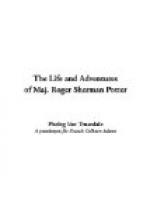to-morrow. It having come the fashion of the
day for managers of theaters to feast their patrons
on the morbid sentimentality of French plays, (as
if the vices of our own social system were not enough
to excite the vicious propensities of our high blooded
youths,) so also would it seem the highest inspiration
of the eighteenth century play writer to rehash and
coarsify for the American stage all those lascivious
eccentricities for which the French are famous.
Hence, your jolly play writer is generally engaged
with his friends, smoking pipes and reading the last
French piece. The pleasure excited by this congenial
occupation is invariably heightened with libations
of whiskey, the play writer having a credit with the
grocer at the corner for three bottles, which, in
a case of emergency, may be extended to four.
He writes occasionally for the Sunday newspapers,
thinks John Brougham the greatest dramatist and wit
of the age, and stands ready either to join him in
a glass or sing his praises, though there is as much
reason for committing so flagrant an outrage as there
would be in praising the ten thousand and one stanzas
written by that wonderful and very eccentric bard,
Richard Yeadon, who has sung of so many springs and
watering places as to dry up his own muse. He
is likewise something of a dabbler at reviewing novels,
but they must be largely sprinkled with murders, and
have plots strong enough to carry anything but the
clergy. All other critics are to him great bores;
but, like them, he has a price for his services, and
will, if you pay him, make Shakspeares and Corneilles
of very ordinary persons. As for respectable
society, he never even scented the perfumery of its
outskirts; he therefore holds it in utter contempt.
Ready at all times to adapt himself to circumstances,
if he chance to get in arrears to his landlady, he
will square the account by marrying either herself
or her daughter.” Mr. Tickler proceeded
in this strain, relating sundry curious things of
the critics, until the night was far advanced, and
concluded by suggesting that no serious damage could
result to his constitution from another punch.
The general immediately fell in with this opinion,
and indeed was so entertained by his narrative, that
he would have ordered a dozen punches without considering
his obligation to him wiped out. The punch being
dispatched, the general slipped five dollars into Mr.
Tickler’s hand, and desired him to proceed to
the host, thank him for his great kindness, and clear
the little score from his ledger. Greatly delighted
at the prospect of performing this service, Mr. Tickler
proceeded to the office, and was informed by the polite
host that it was a custom with him never to take money
of persons driven to seek shelter in his house by
accidents. To end the matter, he vowed it not
only gave him great pleasure to have so distinguished
a military gentleman in his house, which had bore
a character for hospitality he was scrupulous it should
continue to maintain, but that he would be happy to
see him again. Indeed, he wished him success
in all his undertakings, hoping they would bring comfort
in great abundance.




